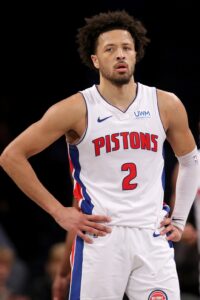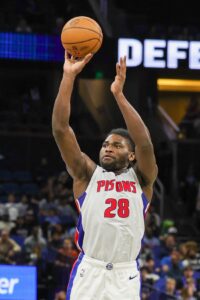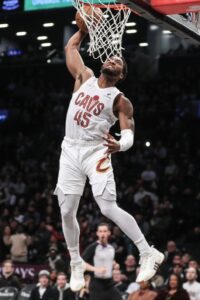With Cade Cunningham healthy and set to return after being limited to 12 games in 2022/23 due to a leg injury, the Pistons entered last fall with aspirations of being in the play-in mix and perhaps even getting their young core some postseason experience.
 That goal seemed sensible enough through the first three games of the season, which included a pair of wins and a one-point loss. It looked – to put it mildly – increasingly unrealistic as Detroit lost its next 28 games in a row and 35 of its next 36 in total. Suddenly, the organization’s goal was simply to avoid the embarrassment of posting the NBA’s worst record of all-time. The team avoided that fate, but its 11-32 finish following a 3-36 start was hardly cause for legitimate optimism entering the summer.
That goal seemed sensible enough through the first three games of the season, which included a pair of wins and a one-point loss. It looked – to put it mildly – increasingly unrealistic as Detroit lost its next 28 games in a row and 35 of its next 36 in total. Suddenly, the organization’s goal was simply to avoid the embarrassment of posting the NBA’s worst record of all-time. The team avoided that fate, but its 11-32 finish following a 3-36 start was hardly cause for legitimate optimism entering the summer.
It has been over four years since the Pistons launched their rebuild in earnest and three years since they landed the No. 1 overall pick that they used to draft Cunningham. The process that general manager Troy Weaver repeatedly referred to as a “restoration” rather than a rebuild was supposed to bear more fruit by now.
The lack of forward progress in Detroit has already cost Weaver his role as head of basketball operations and could result in more significant changes to the Pistons’ roster this offseason, with players once considered long-term building blocks perhaps having their futures on the roster reconsidered.
The Pistons’ Offseason Plan
The Pistons are in the market for a new head of basketball operations and until they officially make a hire, it’s hard to get a sense of exactly what direction their offseason will take. Assuming that new executive has the final say on basketball decisions, which is the expectation, the way he feels about specific players will go a long way toward determining the moves Detroit makes.
At this point though, it seems safe to assume that Cunningham isn’t going anywhere. The 22-year-old will be eligible for a rookie scale extension this offseason and looks like the Piston whose ceiling is the highest, so I’d expect the organization to make an effort to get him locked up for the long term. The only real question there is whether or not he gets the max.
As bad as the Pistons have been since Cunningham made his debut in 2021, he continues to trend in the right direction on an individual level, establishing new career highs in 2023/24 in categories like points (22.7) and assists (7.5) per game, along with field goal percentage (44.9%) and three-point percentage (35.5%). It would be nice if 2022/23 hadn’t been a lost season or if he’d been something a little closer to an All-Star level player this year, but I suspect he’s shown enough to warrant a maximum-salary investment — especially since Detroit’s cap for the years to come is pretty clear.
I’d expect Ausar Thompson, last year’s No. 5 overall pick, to remain part of the core for now too. His jump shot has a long way to go (he made just 21 of 113 three-pointers as a rookie), but he’s a terrific positional rebounder and has tremendous upside as a defender, so should develop into a valuable role player even if he never becomes a reliable threat from outside. If the three-point percentage increases, his ceiling as a player will increase along with it.
Jaden Ivey and Jalen Duren, the Pistons’ lottery picks in 2022, once looked like foundational pieces, but that’s not a certainty heading into the summer of 2024. There are questions about Ivey’s fit next to Cunningham and about Duren’s ability to grow into the kind of defensive anchor and rim protector Detroit would need him to be.
That’s not to say there’s not a place for them in the Pistons’ future, but it’s certainly more of an open question than it seemed to be a year or two ago, especially since the new head of basketball operations will have no particular attachment to those youngsters, having not drafted them himself. The same goes for Isaiah Stewart, who could become a trade chip on his new rookie scale extension if Detroit decides he’s not part of the long-term plan.
Of course, the Pistons will have the opportunity to add another young prospect to their core this June with the No. 5 overall pick in the draft. There has been some speculation that first-rounder could be used as a trade chip, but that will depend on which players come off the board in the top four and what kind of offers are on the table for the pick.
There’s not a ton of excitement about the top of this year’s draft class, but that means the drop-off from No. 1 to No. 5 might not be significant. The Pistons’ new president may want to put his stamp on the franchise right away by taking a swing on a potential cornerstone in that spot. A sharpshooter like Reed Sheppard, a play-making forward like Matas Buzelis, or a three-and-D forward like Zaccharie Risacher would be among the most intriguing options, assuming they’re still available.
The Pistons only have about $57MM in guaranteed money on their books for 2024/25, so even after accounting for cap holds for restricted free agent Simone Fontecchio and the No. 5 pick, they could create upwards of $65MM+ in cap room. After using up that room, they’d be able to go over the cap to re-sign Fontecchio using his Early Bird rights, which I expect they’ll do. A three-point shooter with some size, Fontecchio made a strong positive impression down the stretch after being acquired from Utah and should be in line for a new deal worth at least $12-14MM per year.
Besides Fontecchio, two other notable Pistons are eligible for restricted free agency. However, I don’t expect either former No. 2 overall pick James Wiseman or unlikely 50-point man Malachi Flynn to receive qualifying offers to make them RFAs. They simply haven’t shown enough during their first four seasons in the league to warrant it.
Now, it’s worth noting that Wiseman’s qualifying offer amount dropped by more than half, to about $7.7MM, when he failed to meet the starter criteria, so if the new head of basketball operations remains high on the big man, perhaps the Pistons will decide to take a shot on him for at least one more year. But I’d be surprised if Wiseman gets any sort of multiyear deal like the one Detroit gave Marvin Bagley III in a similar spot a couple years ago.
So what’s the plan for the rest of the cap room? Rumors in recent weeks have suggested that Tobias Harris, Miles Bridges, Malik Monk, and Nic Claxton could be among the free agent targets near the top of Detroit’s board, with trade candidates like Brandon Ingram and Zach LaVine also worth keeping an eye on.
Of course, as we’ve mentioned a couple times already, the new president’s likes and dislikes could go a long way toward morphing that list into something new as the offseason progresses. Remember, Houston was viewed as a prime suitor for James Harden a year ago until the team hired a new head coach (Ime Udoka) who wasn’t all that interested in pursuing the former MVP.
The Rockets, who had the most cap space of any NBA team in 2023, ultimately ended up targeting a couple hard-nosed veterans – Fred VanVleet and Dillon Brooks – who were capable of making an impact on both ends of the floor and complementing Houston’s young core. The Rockets arguably overpaid both players to make sure they landed them.
With a ton of cap room and few long-term commitments on their books, the Pistons could afford to take a similar path this summer, throwing significant short-term money at their top targets and getting out from under those contracts before they’ll need to invest in second deals for most of their young players.
I expect the club to focus on wings who can shoot and big men who can play defense, so the free agents mentioned above all make sense. If they’re more interested in spreading their cap space across three or four players, then Gary Trent Jr., Royce O’Neale, Caleb Martin, Isaac Okoro, and Isaiah Hartenstein are a few others who might be fits.
Salary Cap Situation
Guaranteed Salary
 Isaiah Stewart ($15,000,000)
Isaiah Stewart ($15,000,000)- Cade Cunningham ($13,940,809)
- Ausar Thompson ($8,376,000)
- Jaden Ivey ($7,977,240)
- Jalen Duren ($4,536,840)
- Quentin Grimes ($4,296,682)
- Marcus Sasser ($2,755,080)
- Total: $56,882,651
Non-Guaranteed Salary
Dead/Retained Salary
Player Options
Team Options
Note: Metu’s and Umude’s salaries would remain non-guaranteed if their options are exercised.
Restricted Free Agents
- James Wiseman ($7,744,600 qualifying offer / $30,298,600 cap hold): Bird rights
- Malachi Flynn ($5,809,537 qualifying offer / $11,619,075 cap hold): Bird rights
- Simone Fontecchio ($5,216,324 qualifying offer / $5,216,324 cap hold): Early Bird rights
- Total (cap holds): $47,133,999
Two-Way Free Agents
Note: Because he has finished each of the past two seasons on a two-way contract with the Pistons, Rhoden’s qualifying offer would be worth the minimum salary for a player worth two years of NBA experience (projected to be $2,093,637). It will include a small partial guarantee.
Draft Picks
- No. 5 overall pick ($8,269,440)
- No. 53 overall pick (no cap hold)
- Total (cap holds): $8,269,440
Extension-Eligible Players
- Cade Cunningham (rookie scale)
- Evan Fournier (veteran)
- Extension-eligible until June 30 (or beyond, if his team option is exercised).
- Quentin Grimes (rookie scale)
Note: Unless otherwise indicated, these players are eligible for extensions beginning in July.
Unrestricted Free Agents
Cap Exceptions Available
Note: The Pistons project to operate under the cap. They would have to renounce three trade exceptions – worth $10,489,600, $1,386,800, and $800,926 – in order to use cap room.
- Room exception: $8,006,000
 The absence of Mitchell puts Cleveland in a dire situation as it tries to even the series. The Cavs trail the top-seeded Celtics, 2-1, after losing Game 3 on their home floor.
The absence of Mitchell puts Cleveland in a dire situation as it tries to even the series. The Cavs trail the top-seeded Celtics, 2-1, after losing Game 3 on their home floor. That goal seemed sensible enough through the first three games of the season, which included a pair of wins and a one-point loss. It looked – to put it mildly – increasingly unrealistic as Detroit lost its next 28 games in a row and 35 of its next 36 in total. Suddenly, the organization’s goal was simply to avoid the embarrassment of posting the NBA’s worst record of all-time. The team avoided that fate, but its 11-32 finish following a 3-36 start was hardly cause for legitimate optimism entering the summer.
That goal seemed sensible enough through the first three games of the season, which included a pair of wins and a one-point loss. It looked – to put it mildly – increasingly unrealistic as Detroit lost its next 28 games in a row and 35 of its next 36 in total. Suddenly, the organization’s goal was simply to avoid the embarrassment of posting the NBA’s worst record of all-time. The team avoided that fate, but its 11-32 finish following a 3-36 start was hardly cause for legitimate optimism entering the summer.